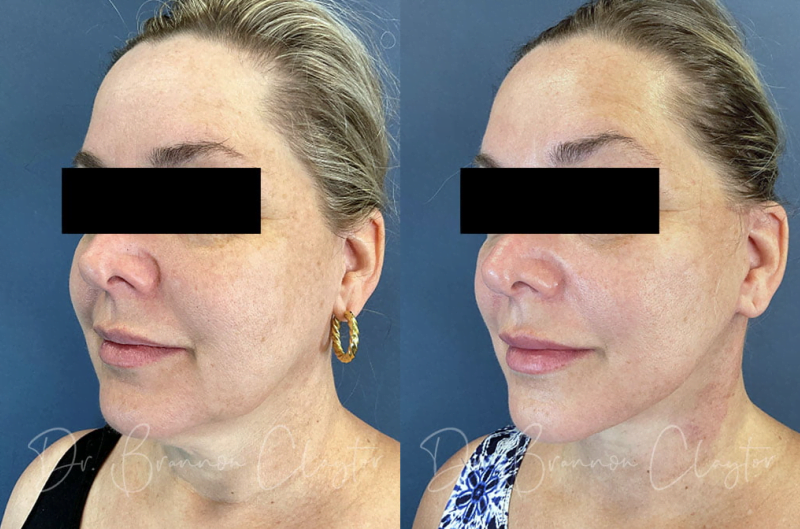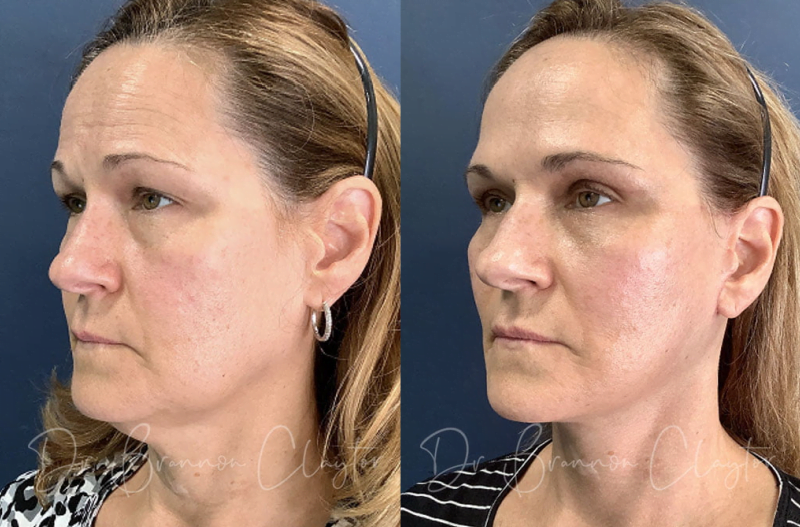Will weight loss or weight gain affect my facelift?

For most people, weight fluctuations are a part of life! But when it comes to investing in your appearance with a facelift, it’s useful to know how weight changes—minor and major—can affect your results.
As a highly skilled deep plane facelift expert and Philadelphia plastic surgeon, Dr. Brannon Claytor understands the nuances of facial aesthetics and what goes into the durability of a well-done facelift. Below, he delves into the relationship between weight fluctuations and facelift outcomes, and shares valuable tips to maintain your rejuvenated look for years to come.
Will weight loss affect my facelift results?
Yes, post-facelift weight loss will affect your results, and could potentially bring back some signs of aging, like fine lines and wrinkles, jowls, sunken cheeks, and wrinkles or sagging in the neck.
Here’s why: Our deep plane facelift technique, which we use for our Philadelphia facelift patients, creates a firm foundation below the skin to lift and anchor the tissues higher on both the face and neck. But when volume is lost during weight loss, aging skin—which loses elasticity over time—may not contract as needed to maintain a firm, smooth appearance. Further, facial fat grafting is often used as part of a facelift to create youthful contours, but losing weight may shrink the carefully grafted fat.
That said, a small amount of weight loss—around 10 pounds or so—is unlikely to significantly affect a well-done deep plane facelift, as the facelift’s deeper repositioning work will not be significantly affected.
Talk with your surgeon about any weight loss or gain you anticipate in the future to decide on the right timing for your procedure. Ultimately, it’s best if you are ready to maintain a stable weight prior to undergoing a facelift for optimal outcomes.
Facelifts typically include neck lifting and tightening
While we often refer to face and neck rejuvenation as “facelift” or rhytidectomy, Dr. Claytor performs most deep plane facelifts in conjunction with open platysmaplasty of the neck—a highly durable neck rejuvenating procedure that achieves gorgeous results. Face and neck aging tend to happen concurrently, making it most patients’ goal to see an improvement in both through their surgery. For this reason, if your weight fluctuates after a facelift, your neck appearance may change, too.
How does weight gain affect a facelift?
While weight loss can “age” good facelift results, moderate weight gain is unlikely to affect how youthful you look. Still, significant weight gain stretches the skin, and if you lose weight in the future, the fluctuations will negatively affect skin’s elasticity.

Reach your goal weight before a facelift
If you are planning to lose weight, make a plan for healthy, gradual weight loss before scheduling a surgery date. Aim for a weight you can maintain with sustainable lifestyle choices. You need to be within 10 pounds of your goal weight, and let some time pass for any natural skin contraction, before meeting with your plastic surgeon to develop the final surgical plan for the best possible surgical results.
Ideal candidates for rhytidectomy
Generally speaking, facelifts are best suited for patients of all ages who want to address skin laxity, wrinkles, sagging jowls or other signs of aging in the face and neck. Patients should also be in good overall health and have realistic expectations for their surgical results.
It’s important to note that facelift surgery will not erase deep wrinkles or significantly change your underlying bone structure; rather, it can help restore a more youthful contour to the face. Overall, this tends to create the appearance of “turning the clock back” by about 10 years.
If you’re considering a facelift, be sure to find an experienced board-certified plastic surgeon with whom you feel comfortable discussing your goals and expectations. Your surgeon will review your medical history as well as any medications before recommending the best course of action for you. At Claytor Noone Plastic Surgery, we understand that every patient has unique needs and concerns when it comes to facial rejuvenation; we strive to create individualized treatment plans that take these into consideration and provide optimal results.

Facelift surgery after massive weight loss or bariatric surgery
If you have undergone significant weight loss, this is a milestone to celebrate. However, it is common to be left with excess skin in the face and neck like drooping jowls, hollows under the eyes, or sagging neck skin. A facelift can help to restore the natural contours of your face and rejuvenate the neck and jowls. We suggest seeking out an experienced board-certified plastic surgeon who can discuss your goals and expectations; a well-rounded surgeon can also help you treat excess body skin with a variety of lifting procedures.
About Philadelphia plastic surgeon Dr. Brannon Claytor
If you’re ready to learn about your facelift options with a deep plane facelift expert, we’re here to help! Dr. Claytor serves patients from all over the Bryn Mawr, Main Line, & Philadelphia areas, and he is happy to talk with you about the best timing for your rejuvenation and answer all of your questions in a personal consultation. Call 610.527.4833 or contact our Philadelphia plastic surgery practice online today.
